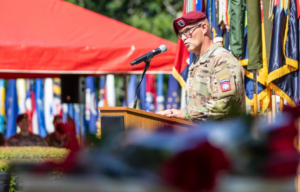President Biden has nominated Lt. Gen. James Mingus, director of the Joint Staff, to be the Army’s next vice chief of staff, according to a congressional notice.
Mingus’ nomination arrives as Gen. Randy George, the nominee to be the next Army chief, testified before the Senate Armed Services Committee on Wednesday that Sen. Tommy Tuberville’s (R-Ala.) ongoing block of military promotions and nominations is “impacting our readiness.”

“Yes, it is impacting our readiness. For us, it’s important that, as we move leaders, to get the right leader in the right place and at the right time and, especially, with the right experience. And so, that’s what we’re challenged with right now with the hold,” George, who is the current vice chief, said during his confirmation hearing.
George’s comments follow remarks from Air Force Chief of Staff Gen. Charles Q. Brown, nominee to be the next Joint Chiefs chairman, during his own confirmation hearing on Tuesday that Tuberville’s block will cause the military to “lose talent.”
“It has an impact not just for the senior officers but all their staff and all those below them. And as you highlighted, whether it’s schools, whether it’s employment or the fact that they already sold their home because they thought they were going to move and they’re now living in temporary quarters, that creates a challenge,” Brown said. “We have our more junior officers who now look up and say, ‘If that’s the challenge that I’m going to have to deal with in the future, I’m going to balance between my family and serving in a senior position.’ We will lose talent because of those challenges.”
Tuberville has yet to show any indication of plans to lift his block on military nominations, reiterating his opposition to the administration’s policy covering travel money for armed services personnel to receive reproductive healthcare, including abortions, outside the states that have made it illegal and extremely restrictive.
“He has been given lots of opportunities and he’s simply refusing to lift the hold,” Sen. Tammy Duckworth (D-Ill.), said during Wednesday’s hearing. “The entire military’s readiness is slowly grinding to a halt. And it’s only going to get worse every single day, because Sen. Tuberville has injected politics into this…who is fundraising off of his hold on the military leadership that is affecting the national security of this country. If he truly cared about this he wouldn’t be fundraising off of it.”
Sen. Jack Reed (D-R.I.), the SASC chair, said it would take 668 hours to consider all 251 pending nominations if the Senate were forced to consider each one individually on the floor, noting the list will continue to grow through the year.
“That is an impossible goal to achieve and, by the way, that would prevent us from dealing with issues like the [NDAA], appropriations bills and other important legislation,” Reed said.
Reed asked George about the cascading effects of senior military leaders not moving forward in their promotions, specifically citing the impact to the Army’s vice chief role in participating on the Joint Requirements Oversight Council if there’s delay due to the hold.
“Having done this for the last year, the vice [chief] job is very busy,” George said. “So we would, again, have to look at the G-3 or the director of the Army staff and that’s challenging as well.”
Mingus, who would receive his fourth star if confirmed by the Senate for the vice chief role, served from 2016 to 2018 as director of the Mission Command Center of Excellence at the U.S. Army Combined Arms Center at Fort Leavenworth in Kansas.
He then took command of the Army’s 82nd Airborne Division at Fort Bragg in North Carolina, before moving to the Joint Staff at the Pentagon where he first served as director for operations before assuming his current role as director last June.
Following Gen. David Berger’s retirement Monday from his role as Marine Corps commandant, Tuberville’s block left the service without a Senate-confirmed leader for the first time in over 100 years (Defense Daily, July 10).
Gen. Eric Smith, who was nominated as Berger’s successor in late May, has been the assistant commandant and will serve as the commandant in acting capacity while his confirmation remains on hold.